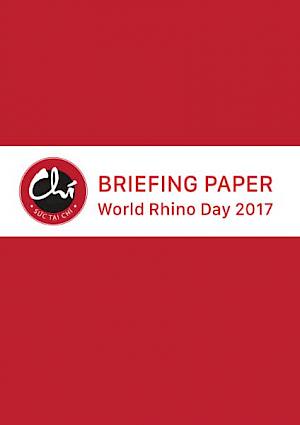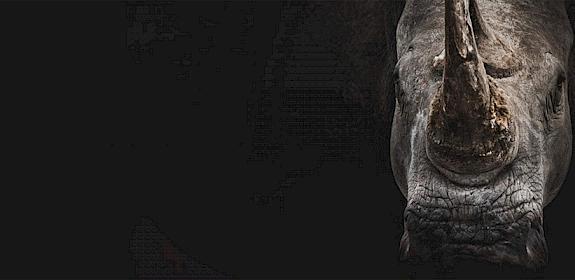Vietnamese media encouraged to become “agents of change” in efforts to deter wildlife crime
Hanoi, Viet Nam, 22nd September 2017 (World Rhino Day)—Approximately 70 influential guests gathered today in Hanoi for a World Rhino Day Seminar organized by TRAFFIC on the role of Vietnamese media in promoting the protection of threatened wildlife, including rhino species.
The seminar was initiated to reveal the powerful way media outlets can incorporate social responsibility into their work and contribute to combatting wildlife crime.

In addition to journalists from the National and Hanoi Press Agency, Viet Nam National Television and local and international newspapers, representatives from government agencies including officials from the Central Committee for Propaganda and Education (CCPE), Ministry of Health, Viet Nam CITES Management Authority, and Vietnam Chamber for Commerce and Industry (VCCI) also attended, alongside officials and professionals from foreign embassies and conservation NGOs.
Over the last decade Viet Nam has regularly been identified as both a transit country and consumer market for endangered wildlife products such as rhino horn and elephant ivory. The ongoing demand continues to drive the criminal activities of wildlife poaching and trafficking, selling, buying and consumption of illegal wildlife products such as rhino horn.
Since 2014, under the Chi initiative, TRAFFIC and other government, civil-society and corporate partners have worked together to reduce demand for rhino horn amongst key groups of consumers. “Chi” refers to “inner strength of will”, a highly-respected trait in Vietnamese society.
The media has played a critical role in helping spread the Chi initiative’s message of “zero-tolerance towards the consumption of threatened wildlife” to larger audiences, including to specific target groups among the business community, shown by comprehensive research to be the most prolific users of rhino horn.
More than ever before, media plays an important role in creating and shaping public opinion on topical global issues such as illegal wildlife trafficking
Madelon Willemsen, Head of TRAFFIC’s Viet Nam Office“As a conservation NGO, TRAFFIC has expertise in delivering social behaviour change communications to discourage undesirable behaviour, such as wildlife-related criminal acts. Media outlets taking on a role as ‘agents of change’ helps to amplify this messaging to maximize its positive impacts.”
“The Vietnamese media plays a critical role in shaping the moral values around the consumption and illegal trade of threatened species and what responsible Vietnamese citizens must do to protect threatened wildlife worldwide.”
During the seminar, representatives from TRAFFIC, civil society organizations, government and the United Nations Office on Drugs and Crime spoke about social responsibility, the importance of wildlife protection, demand reduction efforts for rhino horn in Viet Nam and details on how Vietnamese media can support wildlife protection.
“Behaviour change communications are a useful approach in reducing the demand for illegal wildlife products in Viet Nam,” said Ms. Trinh Nguyen during her keynote speech on the Chi initiative.
An interactive session, where media could ask questions of an expert panel, was another highlight of the day’s events.
“As the national communication educator of the Communist Party of Vietnam, the Central Committee for Propaganda and Education (CCPE) has prioritized encouraging our public servants, propaganda journalists and Vietnamese citizens to change their behaviour to adopt a zero-tolerance towards wildlife crime and illegal wildlife consumption, especially noting that the reasons for consumption are unsubstantiated by scientific evidence. Thanks to the partnership with TRAFFIC’s Chi Initiative, CCPE has educated and promoted the social responsibility of national propagandists about how they can combat wildlife crime, which threatens the national security, sustainable livelihoods, national heritage and the country’s international reputation. We hope that the efforts by CCPE to establish a nationwide attitude of zero tolerance towards wildlife crime will improve the lives of everyday citizens and benefit wildlife threatened by poaching within Viet Nam and around the world,” said Mr. Bui Ngoc Manh, Vice Director, Centre for Professionalism, Scientific Research and Documentation, CCPE.
Ms. Le Thi Thu Thuy, Vice Director, Center for SMEs Promotion, VCCI said, “Chi is an innovative and unique approach to conservation efforts. Through the Chi initiative, TRAFFIC and VCCI are creating a culture of zero-tolerance towards wildlife trafficking in the business world by engaging Vietnamese businesses who will lead their peers in fighting wildlife crime. Together with other organizations and the media, VCCI wants to foster a movement where a growing team of key opinion leaders have established a responsible corporate culture by taking a strong stance against the consumption of rhino horn and other endangered species.”
The seminar was funded by Peace Parks Foundation, Save the Rhino, UK Government, the French Development Agency (AfD) and WWF




